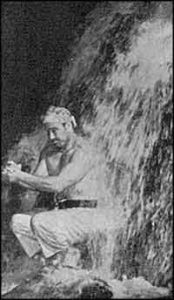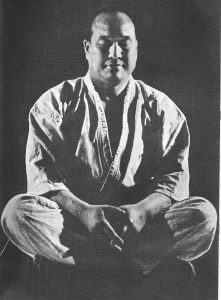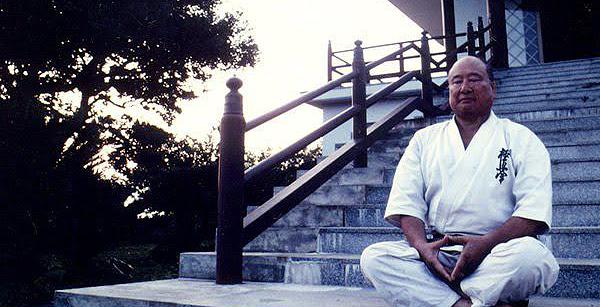Sosai Masutatsu Oyama, the founder of Kyokushin Karate was born in Korea in 1923. From a very early age he had great interest in martial arts, beginning with studying Chinese Kenpo (chuan fa) when he was 9 years old, while living on a farm in China. Returning to Korea when he was 12 he continued his training with local Korean martial arts. At the age of 15 he traveled to Japan and not long after continued his training. He began studying with a focus on judo and karate, eventually achieving 4th Dan Black Belt in Shotokan, 7th Dan Black Belt in Goju-ryu Karate, 4th Dan Black Belt in Judo.
One of Mas Oyama’s instructors was So Nei Chu. A senior student of the founder of Goju-ryu Karate, Chojun Miyagi. It was So Nei Chu who encouraged the young Oyama to dedicate his life to Budo, or the Martial Way. Mr. So suggested that Oyama retreat to a lone mountain for solace, to train his mind and body.
 Following his advice, Oyama traveled to Mt. Minobu where he lived in isolation, training for 12 hours a day, standing under ice cold waterfalls, running and jumping over bushes and boulders as well as using trees as makiwara ( striking aides ). After many months he returned to civilization where he won the karate division of the first Japanese Martial Arts Championships. Again he retreated to the mountains, this time to Mt. Kiyozumi where he continued his rigorous training as well as studying the ancient classics on the Martial Arts, Zen and philosophy. After 18 months he was confident in his ability to return and maintain control of his life.
Following his advice, Oyama traveled to Mt. Minobu where he lived in isolation, training for 12 hours a day, standing under ice cold waterfalls, running and jumping over bushes and boulders as well as using trees as makiwara ( striking aides ). After many months he returned to civilization where he won the karate division of the first Japanese Martial Arts Championships. Again he retreated to the mountains, this time to Mt. Kiyozumi where he continued his rigorous training as well as studying the ancient classics on the Martial Arts, Zen and philosophy. After 18 months he was confident in his ability to return and maintain control of his life.
 Oyama fully understood the nature of Kyokushin Karate as budo karate, a path toward self-perfection though the practice of the martial arts:
Oyama fully understood the nature of Kyokushin Karate as budo karate, a path toward self-perfection though the practice of the martial arts:
“Karate is the most Zen-like of all the Martial Arts. It has abandoned the sword. This means that it transcends the idea of winning and losing to become a way of thinking and living for the sake of other people in accordance with the way of Heaven. Its meanings, therefore, reach the profoundest levels of human thought.
For a long time, I have emphasized that karate is Budo, and if the Budo is removed from karate, it is nothing more than sport karate, show karate or even fashion karate – the idea of training merely to be fashionable.
Karate that has discarded Budo has no substance. It is nothing more than a barbaric method of fighting or a promotional tool for the purpose of profit. No matter how popular it becomes, it is meaningless.”
The philosophy of budo is evident in the name that Mas Oyama chose for his karate style, Kyokushin, which means “UltimateTruth”. It is also reflected in the Dojo Kun and in the Spirit of Osu.
Mas Oyama summed up his entire martial arts philosophy in eleven mottos, known as the Zayu no Mei Juichi Kajo, which are central to his teaching:
Zayu no Mei Juichi Kajo
座右の銘十一個条
Eleven Mottos
- The Martial Way begins and ends with courtesy. Therefore, be properly and genuinely courteous at all times.
- Following the Martial Way is like scaling a cliff – continue upwards without rest. It demands absolute and unfaltering devotion to the task at hand.
- Strive to seize the initiative in all things, all the time guarding against actions stemming from selfish animosity or thoughtlessness.
- Even for the Martial Artist, the place of money cannot be ignored. Yet one should be careful never to become attached to it.
- The Martial Way is centred in posture. Strive to maintain correct posture at all times.
- The Martial Way begins with one thousand days and is mastered after ten thousand days of training.
- In the Martial Arts, introspection begets wisdom. Always see contemplation on your actions as an opportunity to improve.
- The nature and purpose of the Martial Way is universal. All selfish desires should be roasted in the tempering fires of hard training.
- The Martial Arts begin with a point and end in a circle. Straight lines stem from this principle.
- The true essence of the Martial Way can only be realized through experience. Knowing this, learn never to fear its demands.
- Always remember, in the Martial Arts the rewards of a confident and grateful heart are truly abundant.

Amazing and wise words. Long live the great Oyama…and all my best wishes to his surviving family.
Megusta
What does “Zayu no Mei Juichi Kajo” actually mean? How is it translated into English?
Esta pagina deveria ser traduzida em português
Merci pour le post.
OSU!
Thank you for the post Scott, I have only been studying/training in karate for 4yrs, there is so much to learn, but I always find myself reading and re-reading these quotes, as above or from other Masters or Sensei. It is always the root that needs to be strong fed, as the rest grows like branches is csn be tended to, but to have poor roots/basics the person will not grow.
Domo,